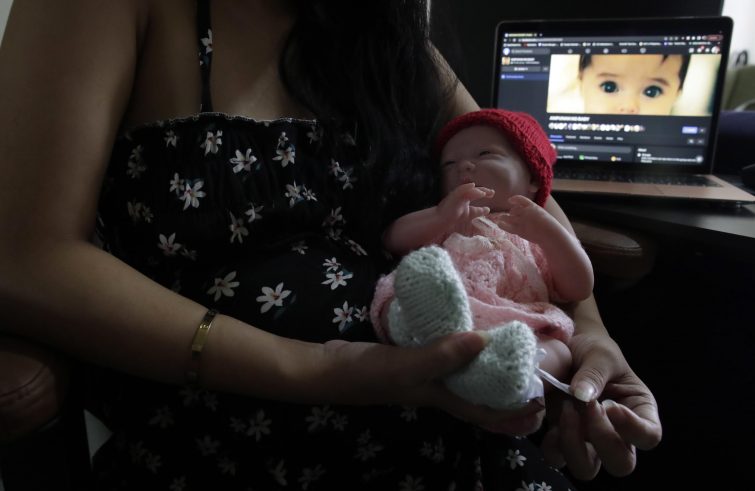
It is rather bizarre to have definitive solutions to ethical and socio-political questions that ultimately involve decisions about human life and the future. Modern sensitivities tend to reject those who support conflicting ideological camps, warning against the lethal disruption of the ethical framework, while underestimating the consequences of choices affecting the lives of many of those involved, starting with the unborn child. In turn, the opposing camps are not always in agreement internally either: environmentalists are both for and against, feminists are both for and against (especially after the ‘Baby fertility fair’ in Milan and Paris), the political Left and Right are also internally divided… It’s a complex situation that spirals out of control.
It should be admitted that nowadays, a couple’s legitimate wish to have a child is definitely not being sustained, victim of a system that seems to only allow childbearing to couples who can count on a steady job, a high level of education and experience. Moreover, the timing of life choices is delayed, and the childbearing age thus reaches its natural end. When the conditions are all in place and only nature stands in the way of bringing a new life into being, for many men and women, the wish to have a child occasionally becomes, in their hearts, a demand to have a child at all costs.
There has been a steady increase in recourse to medically assisted reproduction, and unfortunately also to surrogate motherhood, which notoriously does not only affect gay couples (in the USA it is estimated that almost 70% of the surrogacy cases were for heterosexual couples, with a 20% increase each year). It is hardly imaginable that a legal hurdle will suffice to reverse a trend that crosses national borders, encouraged by libertarian public opinion and democracies where approval ratings are far more important than the quality of proposals.
Languages take shape and, as in Marx’s notion of ‘labour power’, refer to “selected and safe products”, “customers” and “successful sales.” News media report on the reality of “children traded as commodities”, of “hired child-bearers”, exposed to short- and long-term health hazards, not to mention the psychological and ethical consequences. Consent is often insufficiently informed, and remuneration is inappropriate.
The fact that in order to increase success rates, more embryos are transferred into the uterus of the surrogate mother, is grossly overlooked. The risk of death for surrogate mothers, increased caesarean sections and prolonged hospital stay (26 times increased hospital healthcare costs), higher need for intensive neonatal care, maternal and perinatal complications, (such as gestational diabetes, decreased foetal growth, premature death, hypertension and pre-eclampsia due to pregnancies with donor eggs), intracranial pressure in patients preparing for gestational surrogacy with Lupron to receive embryo transfer, are all being overlooked.
As concerns the surrogate babies, it’s hard to determine whether and to what extent they are affected by the deliberate severing of ties with their biological mothers. A number of studies find these babies to be more vulnerable to being underweight, with a four- to five-fold increase in the number of stillbirths, and confirm that by the age of seven, these children find it harder to adjust and that as adults they could be severely genealogically disoriented. The case of the woman (by no means the only one) who by contractual agreement was fertilised by a donor and subsequently gave birth to a baby that did not correspond to the donor’s ideal child and was rejected both by the donor and the surrogate mother is a shocking example.
Utterly disregarding the exploitation of social inequalities and aiming to reward paying customers, the market encourages industries, medical practitioners, wealthy VIPs (among others: Kim Kardashian, Nicole Kidman, Sarah Jessica Parker, Cristiano Ronaldo, Paris Hilton and among same-sex couples, Ricky Martin and Elton John). In India alone, the surrogacy industry is estimated to be worth over $2 billion a year, while ‘volunteers’ earn between $8,000 and $9,000 each pregnancy (equivalent to ten years of labour for an unskilled worker).
For self-evident reasons, on the one side there is a woman who agrees to give/sell her body by renouncing her child, and on the other there is a woman who acquires social motherhood and assumes its obligations; she renounces genetic ties but counts on the fact that during pregnancy the baby is unaware of its biological mother, but develops a relationship with the one who is bearing the baby.
What is most upsetting is that these issues are being reduced to slogans and celebratory demonstrations exalting personal freedom, thereby stifling the most legitimate question as to whether and to what extent it is possible to bypass natural motherhood by delegating it to the two Molochs of scientific research and the market. Equally disconcerting is the position of some feminist and environmental groups at odds with themselves: how can the woman-mother bond be underestimated when for years the focus has been on gender diversity studies and the almost sacred privilege of motherhood? Confusion abounds, and in the midst of the commotion, a shrill justification prevails. The unheard Minister Roccella put it quite clearly: “Surrogacy is tantamount to trafficking in children. The mothers are the ones who give birth.”
Confronted with age-old clashes between nature and culture, between objectivity and subjectivity, the question is whether, when and how the mother-child bond can be severed in a harmless manner. The lawmaker will have to exercise prudence and discernment. One thing is sure: if, on the one hand, nature does not exist without the work of men and women, on the other, everyone has a duty to respect it and guide it, were it only because if it is violated, it will sooner or later backfire and there will be a price to be paid:
“Natura non nisi parendo vincitur.”









